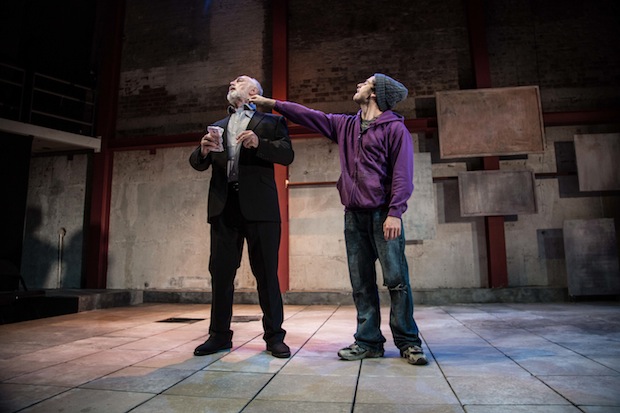Jonah and Otto is a lost-soul melodrama that keeps its audience guessing. Where are we? The Channel coast somewhere. Indoors or out? Not sure. Near a church maybe? Violence barges in. Jonah, a mouthy scruff, shoves a knife in the face of Otto, a dignified old gent with Big Ears whiskers and a dark, elegant suit. This strange assault is followed by further peculiarities. Rather than calling the cops, Otto seeks a rapprochement with Jonah and they start a rambling, off-beat friendship. Later we discover that Otto, a Cambridge-educated vicar, has an adult daughter who was crippled in childhood by a road accident, and this detail lends credibility to his desire to befriend and redeem his mugger.
But the relevant information arrives far too late. And while Otto is a coherent character, Jonah is an exploding bird’s nest of illogicalities. He’s a jobless thief who earns spare cash doing conjuring tricks in pubs (does anyone make money like that?). He plays the harmonica. His father’s dead. He’s an epileptic. He calls Otto ‘Dad’. He resents privilege and wealth. He holds a degree in literature from Hull University. He’s got a French girlfriend. And a baby. Six weeks old, abandoned by its mother, the nipper lies in a shopping trolley throughout the action, wide awake but quite mute — just like all newborns. In the second act, someone flicks a switch and an electronic baby-gurgle seeps out of a hidden speaker.
Further mysteries test our patience. Otto falls asleep, sitting upright on a backless bench, and Jonah removes his jacket, shirt and trousers without waking him up. The dialogue in the closing scene is so fragmented that the characters seem to be honking out random noises rather than conducting a conversation. How, I wondered, could this inept and garrulous dud have penetrated the Park Theatre’s dross-filters? It turns out that the play premiered at Manchester Royal Exchange with Ian McDiarmid, that questionable titan, playing the role of Otto. Not only did the critics take it seriously but they also hailed its most glaring faults as virtues.
This sort of thing has been going on since the 1950s when good sense was overthrown by Ionesco’s mirthless zaniness and Beckett’s punishing obscurity. Theatre copied this upside-down aesthetic from modern art and the connoisseurs of the early 20th century, who claimed to find merit in conceptual hokum even though the naked eye could see nothing but worthless and insolent scrap. Vacuity is taken for complexity, irrationality for sublimity and talentlessness for mastery. It’s a secret game in which the artist, the critic and the professor conspire to dupe the public (who supply their incomes) into believing that garbage is greatness. What for? A love of intellectual mischief and a deep contempt for mainstream opinion, I’d say. This script’s author, Robert Holman, carries the sport to its natural conclusion by boasting that play-goers often leave his shows prematurely. A chef who adopted those principles would celebrate the expiry of every poisoned customer with champagne.
The saving grace here is Peter Egan, whose handsome solemnity and air of wounded romanticism are exactly right for Otto. Plus he has the sort of purring, mellow voice that brings radio directors to their knees. Each line is a treat to listen to. Even if it barely makes sense.

The Papatango new writing prize has been scooped by Fiona Doyle’s Coolatully. The show, set in rural Ireland, is staged on threadbare floorboards with just a couple of chairs and a serving hatch. In this blighted village the old are getting older and the young are getting the hell out. Fatigue and despair drift in on grey clouds sodden with mid-Atlantic rain. Strapping young Kilian has abandoned a sporting career and now lounges in his mum’s near-empty pub serving drinks to penniless customers. His best friend, Paudie, served six months for pilfering the church poor box, and his heart is set on Australia. The village elder, Jimmy, offers Kilian a loan but when the money is stolen, somewhat inexplicably, he suffers a breakdown.
The narrative is a little flimsy and Doyle’s most obvious skills lie in character and atmosphere. She’s certainly a talent. And, oddly enough, she seems more interested in men than in women. (Mind you so are most men.) The production looks good and the Irish accents are exceptionally convincing. Kerr Logan’s powerful, understated turn as Kilian catches the eye. Jimmy, the sweet-natured curmudgeon, is performed with spiky tenderness by Eric Richard, who played a sergeant in The Bill for about a thousand years. The script feels a bit television soap-y and Doyle is in danger of being snapped up by the Beeb and forced to churn out one of those ‘box sets’ that everyone boasts of becoming addicted to. Hopefully she’ll remember the stage.







Comments